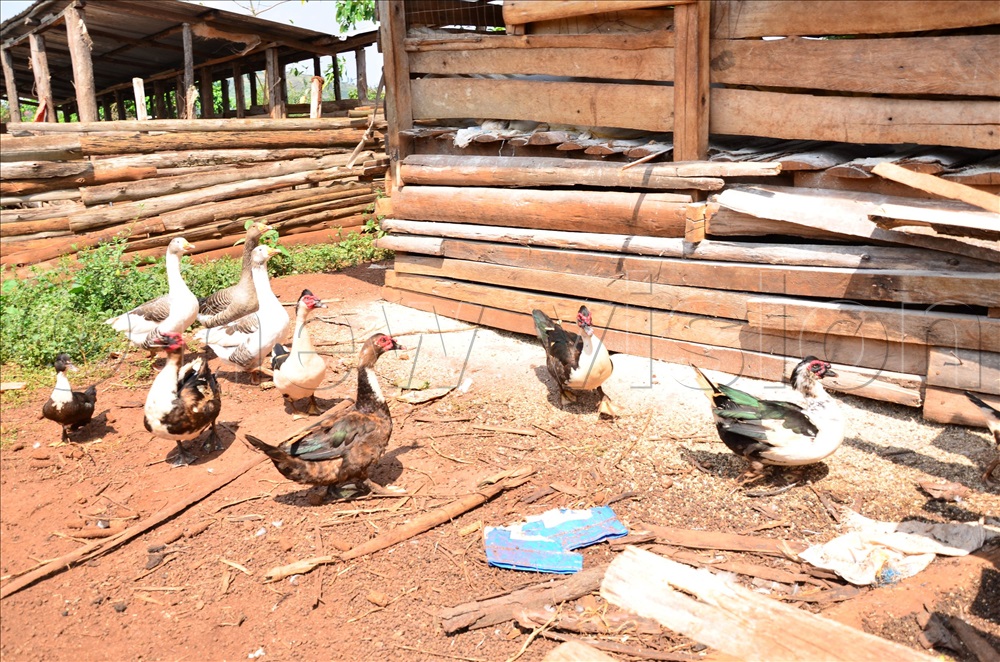By Umar Nsubuga
Kenneth Kabagambe, a commercial farmer in Nyabugorogoro village, Kyenjojo district, says that ducks are more than just charming additions to a farm.
He adds that they are a lucrative venture if fed and managed properly.
If you want to venture into duck farming, understanding how to feed ducks efficiently is key to maximizing their productivity and profits.
Selecting the right duck breed
Kabagambe emphasises that selecting the right breed of ducks is the first step to ensuring a profitable farm. Popular breeds for commercial purposes, such as Muscovy ducks, are good for both meat and eggs.

Such breeds are known for their high productivity and adaptability to various farming conditions.
Feeding ducks for optimal growth
Ducks have specific nutritional needs that change as they grow. For optimal growth, egg production, and meat quality, their diet must be balanced with proteins, carbohydrates, vitamins, and minerals, he explains.
Ducks generally eat a combination of commercial duck feed, grains, vegetables, and insects.
Starter feed
For the first three weeks, Kabagambe says ducklings should be fed a protein-rich starter feed containing 20-22% protein. This ensures they grow quickly and healthily.
Grower feed
“From three to six weeks, gradually transition to grower feed with around 16-18% protein. This helps build muscle, preparing ducks for meat or egg production,” he explains.
Layer feed
She explains that once ducks begin laying eggs, they need layer feed with about 16% protein and extra calcium to maintain strong eggshells and high egg production.
Natural and affordable foods
While commercial feed is important, Kabagambe says supplementing ducks’ diets with natural, readily available foods reduces costs and boosts their health.
“Ducks love foraging for insects, snails, small fish, and greens like duckweed or spinach. If you have a pond, letting them forage there allows them to eat natural foods like algae and small aquatic life,” he explains adding that you can also feed them kitchen scraps, particularly leafy greens, grains like rice, wheat, or maize, and crushed eggshells to boost calcium intake for laying ducks.
Feeding schedule
According to Kabagambe, It’s important to have a regular feeding schedule. Feed your ducks twice a day in the morning and late afternoon. This routine keeps them healthy and productive. Access to clean, fresh water is crucial, as ducks need water to swallow their food and maintain good digestion.
Efficient feeding practices
To reduce wastage, he says to use a feeder that minimizes spillage, and avoid overfeeding, as ducks tend to waste food when given too much.
“When feeding ducks on pasture, provide supplemental feed to ensure they meet their nutritional needs, especially during periods when foraging may not provide enough nutrients,” he explains.
Focus on health and hygiene
Kabagambe says good feeding goes hand in hand with maintaining the health and hygiene of your ducks. Ducks are relatively hardy animals, but a dirty environment can lead to infections, which may reduce productivity. Always clean feeders and water containers daily, and ensure ducks have a dry and clean resting area.
Converting to profits
Ducks can start laying eggs at about five to six months of age. He says each duck can lay up to 300 eggs per year If properly fed and cared for.
“If you’re raising ducks for meat, breeds like Pekin can reach market weight in just 8-10 weeks. By selling eggs or meat, you can make a steady income,” he says.
Moreover, ducks are valuable for pest control in farms. Their love for snails, slugs, and insects can help protect crops, reducing the need for chemical pesticides an added advantage for organic farmers.
Market opportunities
According to Kabagambe, the key to making profits from duck farming is finding the right market. Ducks are highly sought after for their eggs, meat, and even their feathers in some regions.
Farmers’ markets, restaurants, hotels, and supermarkets are potential buyers. You can also explore niche markets, such as organic eggs or meat, which often fetch higher prices.





